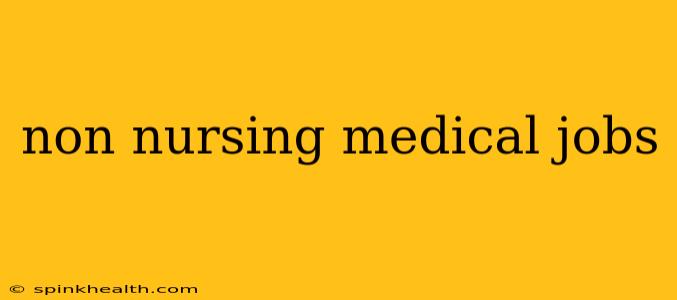Beyond the Bedside: Exploring Thriving Non-Nursing Medical Careers
The world of healthcare extends far beyond the familiar image of nurses bustling around hospital wards. A vast and diverse landscape of opportunities awaits those passionate about medicine but not necessarily drawn to bedside care. This isn't just about doctors; it's a universe of specialized roles, each crucial to the smooth functioning of the healthcare system. Let's embark on a journey to explore some of these rewarding non-nursing medical jobs.
What are some high-demand medical jobs that don't require nursing?
This is a fantastic question, and the answer is surprisingly multifaceted. High-demand often translates to jobs crucial to patient care, administrative efficiency, or technological advancement within the healthcare sector. Think medical billing and coding specialists, whose expertise ensures accurate financial processing. Or consider the rapidly growing field of medical informatics, where professionals manage and analyze vast amounts of patient data, driving improvements in healthcare delivery. Then there are the allied health professions, encompassing roles like physical therapy, occupational therapy, and respiratory therapy – all vital for patient rehabilitation and recovery.
What are some good jobs in the medical field that don't require a nursing degree?
"Good" is subjective, depending on your interests and skills. But "good" often means a job offering stability, intellectual stimulation, and the chance to make a real difference. For those with a scientific bent, medical laboratory technicians play a critical role in diagnosing illnesses through blood tests, tissue analysis, and other lab procedures. For those with strong communication and organizational skills, medical assistants offer invaluable support to physicians, handling patient intake, scheduling, and vital signs monitoring. And for those interested in technology, medical equipment technicians are essential in maintaining and repairing the sophisticated machinery that underpins modern healthcare.
What are the best medical jobs without being a doctor or nurse?
The "best" job depends entirely on individual preferences. But consistently high-ranking non-physician, non-nursing roles include medical imaging technicians (radiologic technologists, sonographers, etc.), who create crucial diagnostic images; pharmacists, who are responsible for dispensing medications and patient counseling; and physician assistants (PAs), who work closely with physicians, conducting physical exams, diagnosing illnesses, and assisting in procedures. Each of these careers offers significant responsibility, intellectual challenge, and the rewarding feeling of contributing to patient well-being.
What are some entry-level medical jobs?
Many entry-level medical jobs require a certificate or associate's degree, making them accessible with shorter training periods. These include medical assistants, emergency medical technicians (EMTs), phlebotomists (drawing blood samples), and certified nursing assistants (CNAs), although the latter is technically related to nursing, offering a pathway into the broader field. These roles provide a great entry point, allowing you to gain experience and decide on a specific career path within the healthcare system. Moreover, many entry-level positions offer opportunities for advancement with further education and training.
What are the highest-paying medical jobs that aren't nursing?
Salaries vary significantly by location, experience, and specialization. However, some consistently high-paying non-nursing medical jobs include anesthesiologist assistants, physician assistants, pharmacists, and certain medical specialists in imaging or laboratory work. The advanced education and specialized training required often translate to higher earning potential. It's important to research specific salary ranges in your area to get a more accurate picture.
Beyond the traditional roles: Emerging opportunities
The healthcare landscape is constantly evolving, generating exciting new possibilities. Consider the growing field of telehealth, demanding professionals with IT skills and medical knowledge. Healthcare administration is another area ripe with opportunities, requiring skilled professionals to manage complex healthcare systems and navigate regulatory environments. Finally, biomedical engineering, combining engineering and medicine, is an exciting field developing life-saving technologies.
This journey into non-nursing medical careers only scratches the surface. The vastness and variety of options available highlight the incredible range of contributions essential to keeping the healthcare system running smoothly and efficiently. Choosing the right path depends on individual skills, interests, and aspirations, but the opportunities for meaningful work and personal fulfillment are abundant.

